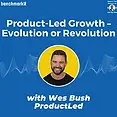
Product-Led Growth
Ecosystem-Led Growth is an evolution of Partner-Led Growth and is the vision of Bob Moore, Founder and CEO of Crossbeam and the author of Ecosystem-Led Growth.
Bob started his tech career as an investor at Insight Partners, and then founded RJ Metrics which was acquired by Magento in 2016, now part of Adobe, and then Bob co-founded Stitch Data which was ultimately acquired by Talend and is now part of Click.
Crossbeam was founded to unlock the modern platform's architecture and data layer enabling companies to collaborate by making it much easier to share data across multiple partner companies. The catalyst to Bob founding Crossbeam was a $2.6B mistake! That mistake was one Bob made at RJ Metrics where they found and then fell out of product-market fit as evidenced by lower growth. When they analyzed the factor leading to the reduced growth, they identified the emergence of the API economy and how buyers wanted to be able to buy point solutions that were easy to integrate with other point solutions - which was the inspiration to build a product that fully leverages the modern data stack and open API ecosystem.
What is Ecosystem-Led Growth? It is the ability to leverage a network of partners who can easily share insights with partners who sell complimentary products to the same target buyers. Simple questions like do we have customers or prospects in common, or do you have an active sales cycle going on that we could partner on to build a joint solution for the customer?
What is the difference between building an "app ecosystem" such as the Salesforce App Exchange and a "partner ecosystem"? It starts with a foundation built upon an open system architecture that enables the sharing of data to collaborate on common target customers, and those companies in the ecosystem are willing to share specific data with partners to make the whole greater than the sum of its parts.
Why are most B2B SaaS companies still using a traditional direct sales model versus focusing more on partner ecosystems as a primary lead source? The answer starts with the negative reputation of how partnership models were implemented, managed, and operated historically. Partnerships were viewed as encroaching on sales rep opportunities and having a partner damage the reputation of their partners by not adequately communicating the value, feature, and function of their partner's solution.
Modern Ecosystem-Led growth does not rely upon an army of partnership reps, it leverages the data that already exists in each partnership infrastructure, such as their CRM system. Now, based upon corporate policy, rules, and intercompany workflows, an existing partner can share the relevant data with their partner(s) which will enable that sales rep to have access to data that will make approaching a new potential customer armed with relevant data regarding the tech stack and preferences of a potential customer.
If you are looking for new ways to increase revenue growth efficiency, decrease customer acquisition costs, and identify "best fit" potential customers by participating in an ecosystem with partners who share those goals and understand the concept of "give to get" this episode is chalked full of ideas, insights and applicable steps to leverage the emerging growth strategy of Ecosystem-Led Growth!
%20.png)


